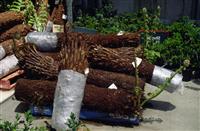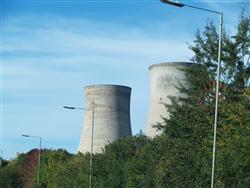Learn about Sustainability, Conservation, Recycling, Environmental Management
Use this course as a starting point for working in:
- Ecotourism
- Land Management
- Recycling
- Alternative Technology
Online Study Course - Enroll in this qualification today, and study at home, by e-learning
 The Course
The Course
This 600 hour course requires you to successfully complete all assignments and pass a single 1.5 hour exam for each of the following modules.
- Ecotour Management
- Soil Management
- Environmental Waste Management
- Conservation and Environmental Management
- plus two of the following:
 Nature Park Management I
Nature Park Management I
- Ornithology
- Wildlife Management
- Alternative Energy
- Marine Studies I
This certificate is accredited through the International Accreditation & Recognition Council.
Graduates who choose to continue studies will be given credit toward higher qualifications with ACS in Australia, ACS Distance Education (UK) or affiliated institutions.
Compulsory Module Outlines:
Ecotour Management Module
 There are nine lessons in this module as follows:
There are nine lessons in this module as follows:
- Nature and Scope of Ecotourism
- Management Issues
- Industry Destinations
- The Tour Desk/Office
- Accommodation Facilities
- Catering Facilities
- Legal Considerations
- Safety
- Planning an Ecotourism Activity
Soil Management Module
This module has eight lessons:
- Physical & Chemical Properties Of Soils
- Soil Testing Methods
- Sustainable Soil Management
- Soils & Managing Earthworks
- Land Degradation & Other Soil Problems
- Container Growing
- Soil Science & Health
- Soil Management
Environmental Waste Management
This subject has 6 lessons as follows:
-
Domestic Waste
-
Street Cleaning and the Disposal of Refuse
-
Industrial Waste
-
Nuclear Fuel and Waste
-
Water and its Treatment
-
Waste and Recycling
Conservation and Environmental Management
This subject has 8 lessons as follows:
-
An Introduction to Ecology
-
A Perspective on Environmental Problems
-
Pollution & Industry Effects On the Environment
-
Water & Soil
-
Vegetation Conservation & Management
-
Animal Conservation & Management
-
Marine Conservation & Management
-
The Future
Typical jobs or career paths in these industries
Careers in Environmental Management can begin with begin with university study and professional development in Environmental Science or Natural Resource Management. Studies in the natural sciences, with some physics and chemistry, can lead to a career in environmental management, as can studies in environmental engineering, which involves structural design, wastewater treatment, flood management, and covers all the natural science disciplines. It is a diverse field with a number of specialisations.
Career options include:
- Environmental Consultant
- Environmental Engineers
- Environmental Education Officer or Manager
- Waste Manager and Pollution Controller
- Technical Officer/Environmental Officer
- Project Officer for Land Councils
- Natural Resource Manager.
Who Employs graduates
Typical Employers include:
- Local and State Government – Department of Natural Resources, Parks and Wildlife Service. etc.
- The private sector - Environmental Consulting Firms, Landscaping businesses (These roles are generally self employed or contracted).
- NGOs – Greenpeace, World Wide Fund for Nature.
- Wildlife Conservation Foundations and Trusts– The Wildlife Trusts (UK), RSPCA (Aus).
- Universities – Research Assistant, Lecturer, Post Doctorate and PhD studies.
Positions can vary from short-term assignments, part-time, permanent roles, and consulting, depending on the employer.
Remuneration and Advancement Opportunities
Remuneration rates vary from country to country; and can be extremely variable.
Entry level jobs may be relatively low paid, and graduates from certificates diplomas and even degrees may undertake voluntary work on projects such as land rehabilitation, or perhaps in wildlife parks, as a way of getting experience and a start in the industry.
Jobs in Environmental Education, Ecotourism and wildlife can pay anything from a very basic wage to something comparable with other professions.
Environmental Scientists and Consultants are generally paid quite well, even during the Graduate phase. Salaries are comparable with other professions such as doctors and teachers.
NGOs and Wildlife Organizations may pay less than government organisations or large businesses; depending on funding capabilities.
Within the natural and environmental sciences there is always some competition. Experience goes a long way in gaining the role you seek and can put you ahead of other applicants. This may be gained from previous employment in a similar role, volunteering and work experience. Networking is very important. A lot of jobs tend to arise internally within companies and organisations. If you are in contact with them or involved in volunteer work, you will find out about these roles first.
Advancement within the field can depend on two things; further qualifications and development of your skills and experience on the job. Start early! Select a course that will give you practical experience and skills, and consider volunteering or work experience while you study. Employers look for employees with demonstrated initiative and skills specific to the job, not just qualifications.
_________________________________________________________________________
Some thoughts from our Academic staff on Waste Management; one of the core subjects you study in this certificate:
WASTE MATERIALS
The world is fast becoming a dwindling supply of resources, and an ever-increasing heap of unusable material. The reason that life has lasted for so long on earth is largely due to natures recycling system. Waste does not exist in nature: everything is recycled. This even includes human & animal breath (oxygen is inhaled and carbon dioxide is exhaled). Animals live by eating plants that derive nutrients from the soil; then eventually those nutrients make their way back into the soil (as animal excreta or carcasses), which starts the cycle over again.
Every individual produces compost materials, but many have tried to opt out of recycling our own wastes. In many ways, we have opted for a one-way system. For example, metals are extracted from the earth and made into tins. After use, the tins are not recycled, but are dumped in landfill instead. It is estimated that the South African packaging industry produces about five million cans a day. Many of these cans are dumped as litter in sports stadiums, parks and other public places; even on highways. This litter is costly to tidy up.
From time to time the packaging industry attempts to defend itself from any blame for the litter problem; they are right in one respect, however some packaging is biodegradable, and other packaging is not: and they do have some choice in what they use.
A survey in Greece revealed the following information:
- A bus ticket takes a month to biodegrade
- Cotton takes five months to biodegrade
- A wool sock takes one year to biodegrade
- A bamboo pole or wooden stake takes three years to biodegrade
- An aluminium can takes 500 yrs. to biodegrade
- A glass bottle would take over 5,000 years to biodegrade
Rubbish Dumps or Tips
It is estimated that in the United States alone, 207 million tonnes of commercial and residential rubbish is produced every year. Most of this is recyclable material. It is amazing what some people dispose of at dumps - and equally amazing that people of all different social status will visit and collect things from dumps, for recycling. In Germany, some towns and cities even operate a system to allocate specific suburban streets the rights to visit and collect waste from dumps on specified days. People actually compete to get there early to get first selection of what is available.
If waste products are recycled, the following can happen:
- Resources would be conserved
- The need to import goods would reduce (resulting in better national balance of trade)
- Less energy would be needed to produce goods from raw materials
- Land would not be needed for rubbish tips
- Labour intensive operations would be created (i.e. job creation)
- It would help fight inflation
- It would reduce pollution
- It would help charities make money by setting up their own recycling depots
Recycling
Where possible, if a product cannot be reused, it should be recycled. If a product is recycled, then it is kept out of landfill whilst also reducing the need for virgin material being used to make more products.
In developed countries, the public has tended to be lethargic about waste. Attempts have been made in many countries to get householders and businesses to separate their waste into different components such as:
- Glass
- Metals
- Paper
- Wet refuse
- Compostable material etc.
The success of recycling has been mixed in different places, and depends heavily on the criteria laid out by the governing body for a specific area.
Plastics
These are very versatile packaging materials, and most controversial. Plastics are definitely a convenience product, and it is difficult to imagine what we did before them. The overuse of plastics however has created some serious environmental issues with respect to disposal of these products, due to their limited biodegradability:
- Developed countries have found plastics a boon to packaging, but the world is filled with plastic products (e.g. toys) and packaging which are a serious waste problem
- In developing countries, plastics are also a problem, but their use has
been more mundane, for such things as water containers, building
materials or water pipes
Plastics also replace the need for some paper. Manufacturers of plastic packaging claim that if their materials were to be replaced by paper, the packaging industries energy consumption would increase by 25% and many more of the world’s forests would need to be harvested to meet the demand.
Despite being relatively inert (e.g. not causing poisoning) plastic products do have various serious environmental affects, for example:
- Some plastic products can get caught on and tangle or choke animals
- Plastic can create impermeable barriers stopping drainage in the soil
Gas from Land Fills
Organic material decomposing underground in a land fill (waste dump) will frequently produce large quantities of methane and carbon dioxide gas. As discussed earlier in the lesson, this can pose an environmental problem if left, but may also be used as a resource. By sinking a pipe and tapping this gas, carbon dioxide may be removed (bubbling it through water), to give methane which can be used for fuel.
Domestic Waste
There are three ‘R’s’ to remember when dealing with domestic waste:
- Reduce the amount of waste produced
- Re use waste
- Recycle waste
Ways to Reduce Waste
- Plan your shopping, buy products that will create minimal waste, and don't buy something unless you need it
- Buy in bulk and reduce the amount of packaging
- Avoid over packaged products and food like cling wrapped vegetables, or meat in polystyrene trays
- Choose durable items that will last a long time
- Buy products with a recycled content
- Use rechargeable batteries wherever possible
- Use cloth towels instead of paper towels
- Avoid disposable cups, plates and cutlery
- Use permanent rather than disposable food storage containers
- Take your own basket to do shopping, rather than using plastic carry bags
- Use both sides of paper when making photocopies
Ways to Re-use Waste
- Reusable containers should be returned to the manufacturer/seller
- Plastic bags may be reused
- Charities will welcome unwanted clothes, furniture, toys, books and magazines
- Try to repair things rather than throwing them away
Ways to Recycle your Waste
- Buy where possible products that can be recycled
- Contact your local government body and find out what sort of recycling regulations are in place for your locality
- It is important to identify which products can be recycled in your area, despite a product possessing a ‘recyclable’ tag
ENROL AND LEARN